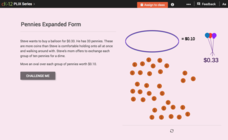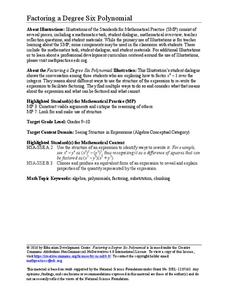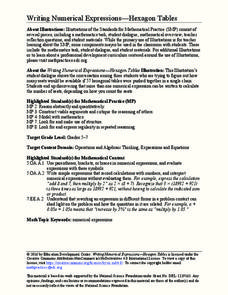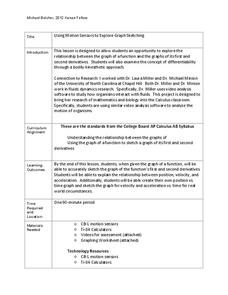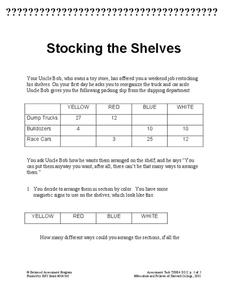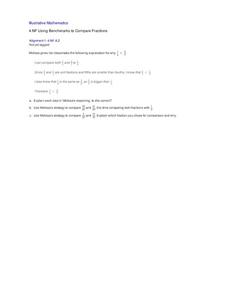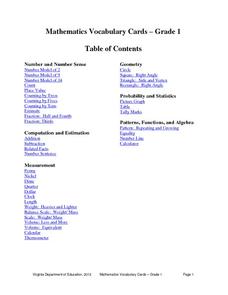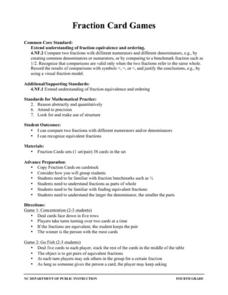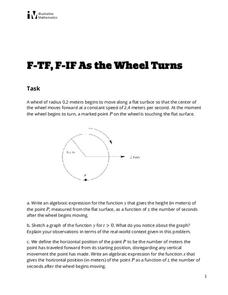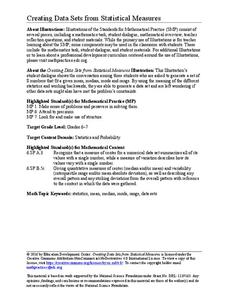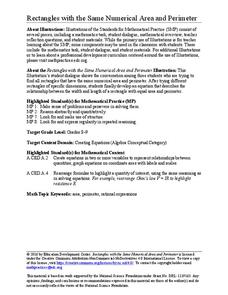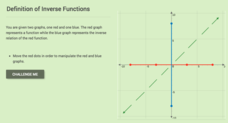Firelands Local Schools
Exponential Growth and Decay
How can you safely model exponential growth and decay? A hands-on activity uses candies to model not only exponential decay, but also exponential growth. Exponential equations are fitted by hand and by use of a calculator...
Mathematics Assessment Project
Deducting Relationships: Floodlight Shadows
Try to figure out what happens with shadows as a person moves between two light sources. A formative assessment lesson has individuals work on an assessment task based on similar triangles, then groups them based on their...
CK-12 Foundation
Numbers in Expanded Form: Pennies Expanded Form
Beginning with a word problem that poses the question of making groups of 10 pennies to translate into a single dime, pupils are challenged to make sense of the amount of dollars 33 cents is in expanded form.
Education Development Center
Factoring a Degree Six Polynomial
Within collaborative groups, scholars factor a degree six polynomial. They can factor the polynomial using many different strategies — a great way to prompt mathematical discussion.
Education Development Center
Writing Numerical Expressions—Hexagon Tables
Explore a basic pattern to practice writing expressions. In collaborative groups, learners examine a contextual pattern and write an expression to model it. The task encourages groups to describe the pattern in multiple ways.
Kenan Fellows
Using Motion Sensors to Explore Graph Sketching
Get moving to a better understanding of graphs of derivatives. Using motion sensors, scholars vary their velocities to create graphs of the first derivative of a function. The activity challenges groups to first create a script of the...
Concord Consortium
Stocking the Shelves
How many ways can you stock a shelf? It's probably more than you think! Young scholars use data in a frequency table to determine how many ways to stock a shelf given a specific constraint for types of groups. They then repeat the task...
Illustrative Mathematics
Using Benchmarks to Compare Fractions
Introduce a new strategy for comparing fractions by analyzing Melissa's use of benchmarks. Walk the class through her process, calling on students to explain their understanding of each step she took. Then practice this method on two...
Virginia Department of Education
Mathematics Vocabulary Cards - Grade 1
Clarify basic math concepts with a series of vocabulary posters designed for first graders. The cards include illustrations for fractions, place value, tally marks, and number lines, as well as many more vocabulary words.
North Carolina Department of Public Instruction
Fraction Card Games
Have fun with fractions in a math card game activity! Cut out the fraction cards and use them to reinforce fraction concepts, including common denominators, parts of a whole, and equivalent fractions.
Charleston School District
Contextualizing Function Qualities
Let the graph tell the story! Adding context to graphs allows learners to analyze the key features of the function. They make conclusions about the situation based on the areas the graph is increasing, decreasing, or has a maximum...
Los Angeles Valley College
Adding and Subtracting Integers
Practice adding and subtracting positive and negative numbers with a forty-problem integers worksheet.
Radford University
The Puppy’s Empire
Dogs can't do math ... but people sure can! A set of five lessons has scholars apply math concepts to solve problems related to buying a new dog, such as designing a fence and a dog house, estimating how large the dog will become, and...
Alabama Learning Exchange
Classifying Complex Numbers
Imaginary numbers are a real thing. Scholars learn about complex numbers, real numbers, and imaginary numbers. They classify given numbers as strictly complex, strictly real, or strictly imaginary in an individual or group activity.
HHS Math
Group Worksheet 1F - Graphing and Finding Zero
Graph quadratic functions and find the zero in this activity. Twelve problems range from those that could be quickly factored and graphed, to those that require use of the quadratic formula and their graphs approximated. Solutions...
Illustrative Mathematics
As the Wheel Turns
Determine the location of a point on a moving wheel. The task challenges groups to determine the horizontal and vertical locations of a point on the edge of wheel that is moving. Teams first determine a function that will model the...
Education Development Center
Making Sense of Unusual Results
Collaboration is the key for this equation-solving lesson. Learners solve a multi-step linear equation that requires using the distributive property. Within collaborative groups, scholars discuss multiple methods and troubleshoot mistakes.
Education Development Center
Creating Data Sets from Statistical Measures
Explore the measures of central tendency through a challenging task. Given values for the mean, median, mode, and range, collaborative groups create a set of data that would produce those values. They then critique other answers and...
Education Development Center
Integer Combinations—Postage Stamps Problem (MS Version)
Number patterns can seem mysterious. Help your learners unravel these mysteries as they complete an intriguing task. Through examination, collaborative groups determine that they are able to produce all integers above a certain...
Education Development Center
Rectangles with the Same Numerical Area and Perimeter
Is it possible for a rectangle to have the same area and perimeter? If you disregard units, it happens! In a challenging task, groups work to determine the rectangles that meet these criterion. The hope is that learners will naturally...
CK-12 Foundation
Inductive Reasoning from Patterns: Greeting with Handshakes
Greet this resource like an old friend. An interactive has users investigate the number of handshakes required for a group to greet each member. A set of challenge questions ensures that learners have a solid understanding of the...
CK-12 Foundation
Definition of Inverse Functions
Investigate the definition of inverse functions graphically. Using the interactive, scholars create a graph of a function and view its resulting inverse. They then determine whether a group of functions have inverses that are also...
K20 LEARN
ADA Accessibility: Inverse Trigonometric Functions
Ramp up using trigonometric ratios. After receiving a request to check school ramps to verify they meet ADA requirements, groups calculate the angle of the incline on ramps on campus. They report their findings via a letter to the...
American Statistical Association
Happy Birthday to . . . Two?
How many people do you need in a room before two likely share the same birthday? Scholars consider this puzzle by analyzing a set of data. They ponder how to divide the data and determine the proper size of a group for this event to...
Other popular searches
- Grouping Math
- Math Grouping Numbers
- Math Grouping and Sorting
- Equal Grouping Math
- Math Brackets
- Math Grouping Tens
- Math Grouping Activity
- Math Grouping Worksheets
- Math Lessons Ncaa Brackets
- Grouping in Math




